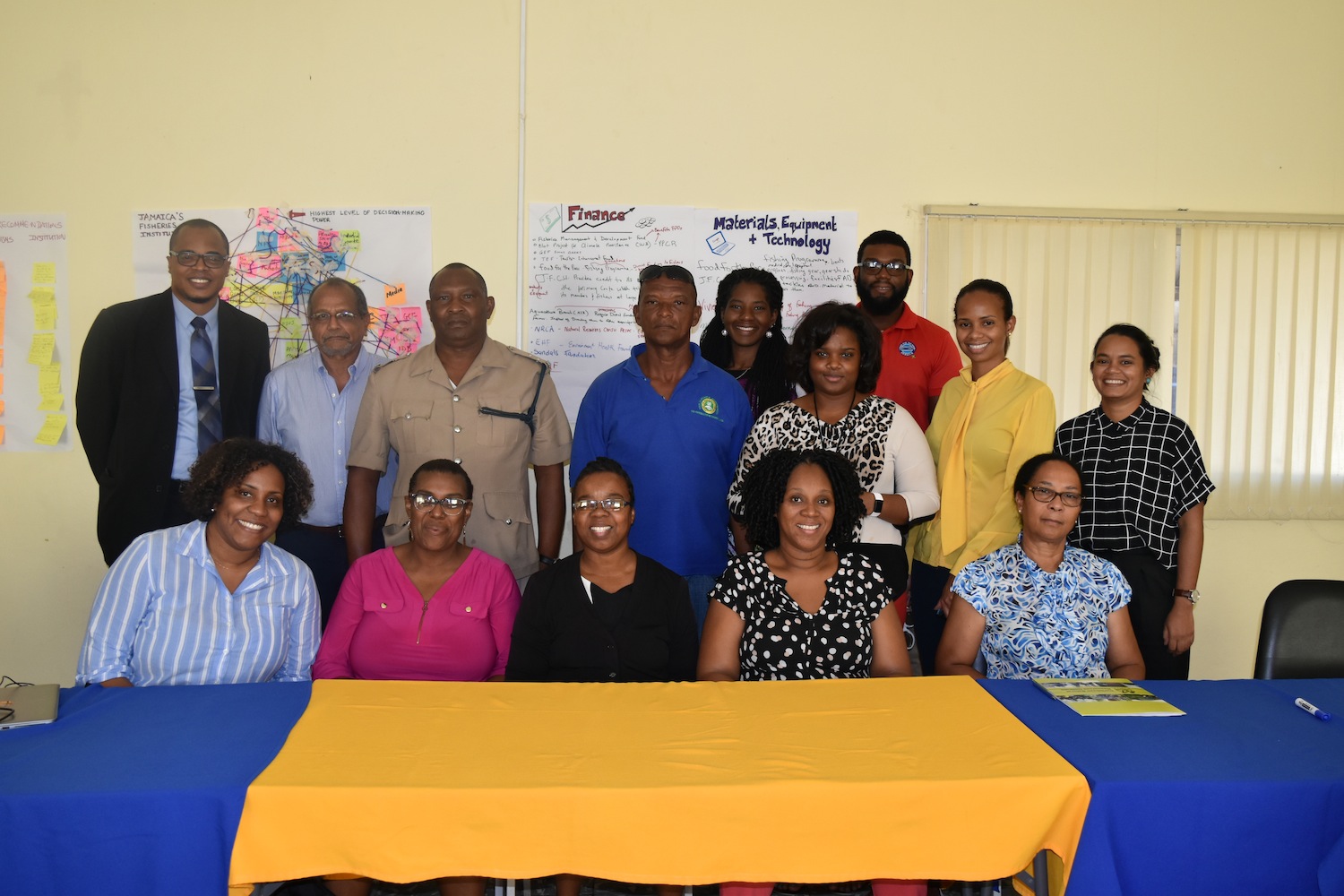Strengthening fisheries institutions to support ecosystem stewardship by Caribbean fisherfolk

Port of Spain, February 6, 2020 – Ecosystem stewardship by Caribbean fisherfolk can contribute to maintaining a healthy marine environment and sustainable fisheries in the region. Successful stewardship would require support from and collaboration with fisheries-related public sector agencies.
Under the “Developing Organisational Capacity for Ecosystem Stewardship and Livelihoods in Caribbean Small-Scale Fisheries (StewardFish)” project, co-executing partners, Caribbean Natural Resources Institute (CANARI) and Caribbean Regional Fisheries Mechanism Secretariat (CRFM Sec.), recently kicked-off a series of two-day national workshops aimed at validating and gathering further stakeholder input on the preliminary findings of analyses of fisheries institutions to support fisherfolk and their organisations in ecosystem stewardship. The analyses are being conducted by CANARI in the seven StewardFish project countries– Antigua and Barbuda, Barbados, Belize, Guyana, Jamaica, St. Lucia and St. Vincent and the Grenadines.
The results from the institutional analyses will be used to develop and prioritise recommendations for improving fisheries-related public sector capacity to promote, facilitate and support ecosystem stewardship of fisherfolk organisations.
The first workshop was held from January 28-29 in Jamaica* and included representatives of fisheries-related public sector agencies, such as the Department of Cooperatives and Friendly Societies, Marine Police, Ministry of Foreign Affairs and Foreign Trade, National Environment and Planning Agency and the National Fisheries Authority and civil society organisations such as the Caribbean Coastal Area Management Foundation (C-CAM), Food for the Poor Jamaica and the Jamaica Fishermen’s Cooperative Union (JFCU). The Food and Agriculture Organization of the United Nations (FAO) also participated in the workshop.
The two-day workshop gave participants an opportunity to explore the policy and legal context for ecosystem stewardship in Jamaica, mechanisms for fisherfolk participation in decision-making and existing resources to support ecosystem stewardship by fisherfolk and their organisations. Participants also recommended priority actions that could be taken to address gaps in each of these areas. These recommendations will be addressed in subsequent activities, in collaboration with the CRFM Sec.
Workshops for the other project countries will be held between February and April 2020.
About the StewardFish project:
The StewardFish project is aimed at implementing the 10-year Strategic Action Programme for the sustainable management of shared Living Marine Resources in the Caribbean and North Brazil Shelf Large Marine Ecosystems (CLME+ SAP) within the seven countries by empowering fisherfolk throughout fisheries value chains to engage in resource management, decision-making processes and sustainable livelihoods, with strengthened institutional support at all levels. The project is funded by the Global Environment Facility (GEF), implemented by the United Nations Food and Agriculture Organization (FAO) and executed by the Caribbean ICT Research Programme (UWI-CIRP), Caribbean Natural Resources Institute (CANARI), Caribbean Network of Fisherfolk Organisations (CNFO), Caribbean Regional Fisheries Mechanism (CRFM), Centre for Resource Management and Environmental Studies of the University of the West (UWI-CERMES) and Fisheries Division(s) of Antigua and Barbuda, Barbados, Belize, Guyana, Jamaica, and Saint Lucia, St. Vincent and the Grenadines. Learn more about StewardFish here: https://canari.org/stewardfish-project/
About CANARI:
The Caribbean Natural Resources Institute (CANARI) is a regional technical non-profit organisation which has been working in the islands of the Caribbean for more than 25 years. Our mission is to promote equitable participation and effective collaboration in managing natural resourcescriticaltodevelopment. Ourprogrammesfocusoncapacitybuilding,policyplanningand development, research, sharing and dissemination of lessons learned, and fostering regional partnerships. See here for more information on CANARI: http://www.canari.org/.




